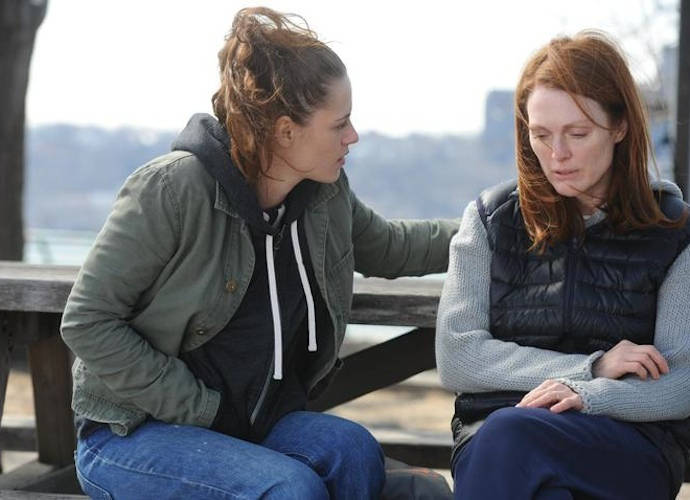‘Still Alice’ Review: Julianne Moore Will Make You Cry

4/5
Still Alice has been touted as the film that finally wins Julianne Moore her Oscar, and given Moore’s subtle performance, it should be.
Still Alice Movie Review
In the film, Moore plays Alice Howland, a woman who is diagnosed with Early-Onset Alzheimer’s Disease. Directed and written by Richard Glatzer and Wash Westmoreland (Quinceañera), the movie tells the story from Alice’s point of view, using changes in focus and use of sound to put the audience in Alice’s place when she gets lost for the first time or struggles to comprehend what is going on around her. These moments are both necessary and carefully calculated, only appearing a few times throughout the film. And, while the work done by Glatzer, Westmoreland and cinematographer Denis Lenoir works well to elevate these moments, it’s Moore’s powerful performance that makes the film.
With five Oscar nominations under her belt, including one for Still Alice, there is no doubt that Moore is a talented actress, and she delivers yet another magnificent performance in Still Alice. Moore has the uncanny ability to go from anger to despair to confusion to happiness without leaving the audience behind or dragging them along with her. Moore’s existence onscreen feels completely natural and authentic – delicate. Other than Moore’s heartbreaking ease in portraying a woman who, in many ways, dies little by little throughout ever scene, what is perhaps most impressive about Moore is her ability to transcend her celebrity. While other actors need to change their look drastically in an effort to escape their celebrity status and truly escape into a role, Moore almost always looks like herself. Becoming Alice onscreen did not require any drastic changes in appearance, and yet one never feels that they are watching Moore act. She has captured that elusive effortlessness that makes an actor great, and it’s time the Academy recognizes her insane talent.
In contrast, her co-star Alec Baldwin, who plays Alice’s husband, John, hasn’t quite managed to eclipse his (sometimes) controversial public persona. Baldwin is good as John, never over-acting, but it was jarring to see him play a regular guy, free from the sarcastic tone Baldwin is now known for. That said, the entire ensemble worked well together. Kate Bosworth and Kristen Stewart were both excellent as Alice’s daughters, Anna and Lydia, as was Hunter Parrish, who played their brother, Tom.
Still Alice does lose its footing when exploring Alice’s memories of her dead sister, cutting to grainy footage of a young Alice and her sister playing on a beach with their parents. The flashbacks feel forced and are a bit redundant, but are thankfully infrequent enough not to cause a huge disruption in the flow of the film. They are the only scenes in which the film feels manipulative, though the music also errs on the side of sentimentality.
One thing Still Alice does brilliantly is incorporate technology into Alice’s slow descent into Alzheimer’s Disease. Alice’s smart phone is her lifeline. In some instances it’s as if all the memories she has collected and since lost are held there. And that, in essence, contributes to the core question of the film: do memories make a person who they are, do they make a person living or dead?
RELATED ARTICLES
Get the most-revealing celebrity conversations with the uInterview podcast!






Leave a comment